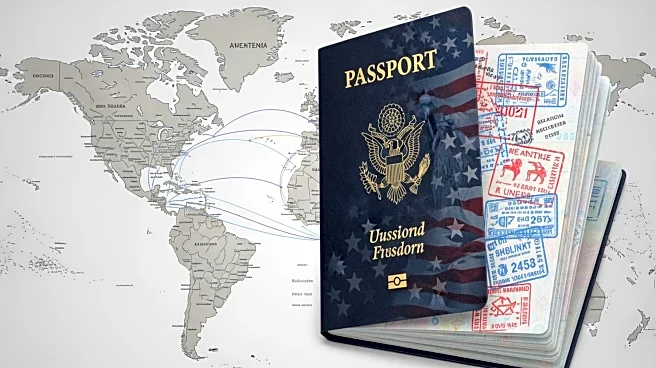What's Happening?
The United States passport has experienced a significant decline in its global ranking, falling to 12th place in the Henley Passport Index 2025. This marks the first time the U.S. passport has dropped
out of the top 10 in the index's 20-year history. Previously ranked first in 2014, the U.S. passport now offers visa-free or visa-on-arrival access to 180 countries, tying with Malaysia. The decline is attributed to changes in international visa policies, including Brazil's termination of its visa-free policy for U.S. nationals and restrictions from several Asian countries. The shift highlights the growing complexity of global travel regulations and evolving diplomatic relations.
Why It's Important?
The drop in the U.S. passport's ranking has significant implications for American travelers, who may face increased challenges in global mobility. This change could lead to more visa requirements and pre-approvals for destinations that were previously accessible without such hurdles. The decline also underscores the rising influence of Asian countries in travel diplomacy, as nations like Singapore, South Korea, and Japan continue to strengthen their passport power. This shift may affect U.S. tourism, business travel, and international relations, as American citizens navigate new travel restrictions and diplomatic dynamics.
What's Next?
As the U.S. passport's ranking continues to evolve, American travelers may need to adapt to new visa requirements and travel policies. The U.S. government may seek to negotiate new bilateral agreements to improve travel access for its citizens. Additionally, the growing influence of Asian passports could prompt the U.S. to reassess its diplomatic strategies and international relations to enhance global mobility. Stakeholders in the travel industry, including airlines and tourism companies, may also need to adjust their offerings to accommodate changing travel patterns.
Beyond the Headlines
The decline in the U.S. passport's ranking may reflect broader geopolitical shifts and changing perceptions of American influence abroad. As Asian countries gain prominence in global mobility, the U.S. may face challenges in maintaining its diplomatic leverage and soft power. This development could also impact cultural exchanges and international collaborations, as travel becomes more restricted for U.S. citizens. The evolving landscape of global mobility may require the U.S. to rethink its foreign policy and international engagement strategies.









